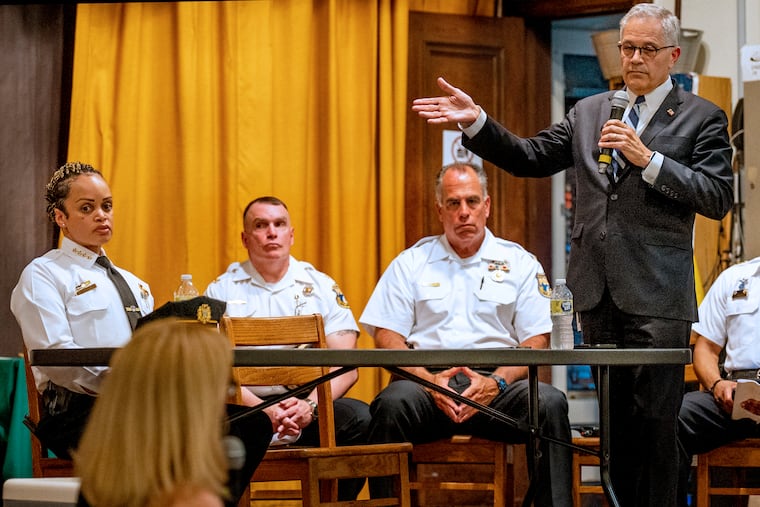What happens when a city’s chief prosecutor refuses to prosecute?
Philly's District Attorney Larry Krasner can — and should — expect pressure from Harrisburg until the city gets back on track.

In America, the executive branch of government is charged with executing the laws. But what can we do when officials refuse to do their jobs? It’s a question that comes to mind fairly often these days, especially with regard to district attorneys like Larry Krasner, who preside over rising crime while refusing to take action against it.
Philadelphia’s crime epidemic has been growing in its deadly scope for years now. Murders — especially murders with guns — dominate the headlines as they shatter the lives of families across the city. The South Street shooting earlier this month is only the latest, most prominent example of that relentless flow of innocent blood.
You would think that these horrible crimes would spur the actions of those charged with the duty of putting criminals in jail and keeping the peace. Mayor Jim Kenney talks of the city “doing everything it can” to limit gun violence, but a look at Krasner’s office over the past few years shows the untruth of this. Kenney may not control Krasner, but he could at least acknowledge his failures. As the District Attorney’s Office’s own website shows, prosecution rates for illegal gun possession have been declining even as those guns — and the people wielding them — are seemingly everywhere.
Charges dismissed
Focusing on firearms crimes, we can see that the rate at which charges were dismissed in Philadelphia grew from 2015, when just 17% of gun charges were withdrawn by the District Attorney’s Office, to a 61% withdrawal rate in 2021. To put it another way: the majority of people arrested on gun charges in Philadelphia last year faced no penalty for their actions.
Progressives will often blame the guns themselves for crime, while conservatives are apt to say that “guns don’t kill people, people kill people.” Here, though, both sides can find fault with the District Attorney’s Office as it refuses to prosecute the people who use guns in crimes. Gun-toting criminals are turned loose with no consequences. Does that sound like the city “doing everything it can”?
As the city studied the issue earlier this year, the District Attorney’s Office did its best to shift the blame to things it could not possibly fix. In a report from January, it noted that “shootings are far more associated with systemic racism and the disinvestment and poverty that it has caused in Philadelphia than they are any particular criminal profile of a person.”
It is true that more of Philadelphia’s shootings happen in poor neighborhoods and in communities of color, but it does no service to the law-abiding citizens there for the district attorney to refuse to protect them. And explicitly refusing to protect them is exactly what Krasner’s office has done; as they said in the same report, “we do not believe that arresting people and convicting them for illegal gun possession is a viable strategy to reduce shootings.”
A model in Chester?
The same month that the city’s report was issued, the city of Chester announced that its homicide count had plunged by 38% since November 2020. How did that poorer, smaller city do so much better than Philadelphia? Delaware County District Attorney Jack Stollsteimer did not chalk it up to one simple cause, but he acknowledged that a greater certainty of arrest, prosecution, and jail time plays a role, along with better access to social programs.
Like Stollsteimer and others in Chester, Krasner could work for equality and prosecute people arrested for illegal guns — it is not an either/or issue.
Krasner came to office promising not to do his job when it came to prosecuting low-level drug offenses. That’s an odd platform for an elected official, but it is at least partly understandable — the 50-year drug war has been mostly a failure, one that put too many people in jail for nonviolent crimes. It would be better for the legislature to change the law than for the executive to just ignore it, but Krasner told the people what he would do and they elected him anyway.
Extending that position to gun crime is a different matter. With over 2,000 shootings in 2021 alone — 446 of them fatal — the issue is not just academic: Krasner’s refusal to do his job leads to more illegal guns on the street.
“What can the people do when the executive branch refuses to execute the law?”
What can the people do when the executive branch refuses to execute the law? Some state legislators think impeachment is the answer. State Sen. Jake Corman first raised the issue while he was running for governor, which made many people ignore it as just an attempt to score points by attacking Philadelphia.
Any attempt by Harrisburg to dictate how Philadelphia is governed will feel like an attack. But faced with a district attorney who refuses to carry out the duties of his office and a city with shootings happening every day, it makes sense that people would start to get frustrated. This week, three more state lawmakers raised the possibility of impeaching the lethargic prosecutor.
Local control of government is usually a good thing. But with no possibility of a recall election (our state constitution does not allow it, for now) and the next regular election for district attorney in 2025, impeachment feels like the only choice to get the city back on track. Unless things change, unless Krasner starts to do the work he was elected to do, pressure from Harrisburg will — and should — continue.
The attempt may fail, but it should serve as notice to the district attorney that the people expect him to, at the very least, do his job. If he still refuses, he should expect the impeachment efforts to continue.
Kyle Sammin is an editor-at-large at Broad + Liberty.